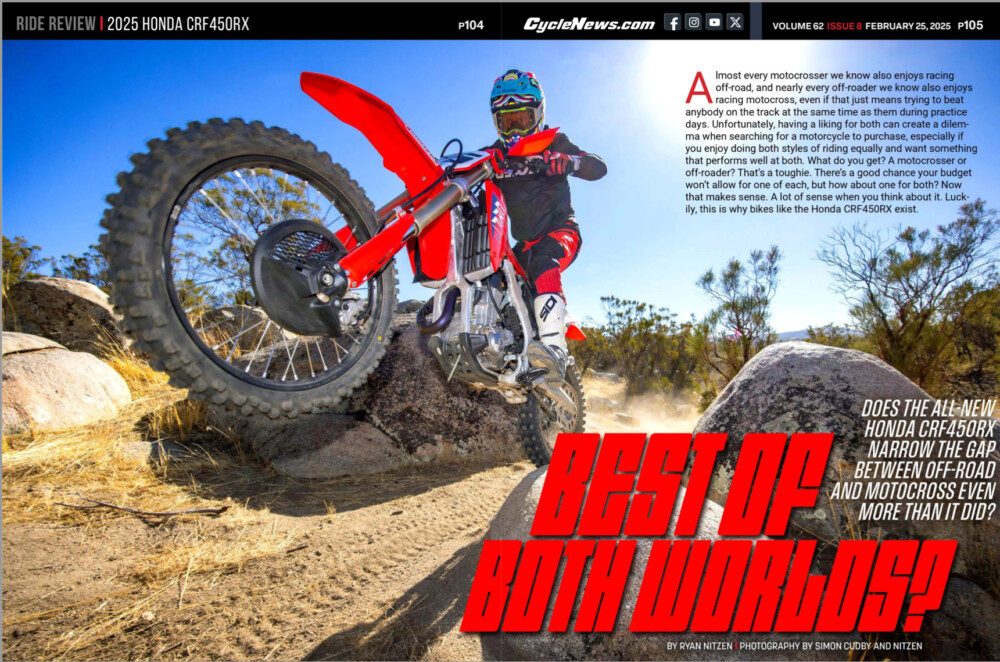Does the all-new Honda CRF450RX narrow the gap between off-road and motocross even more than it did?
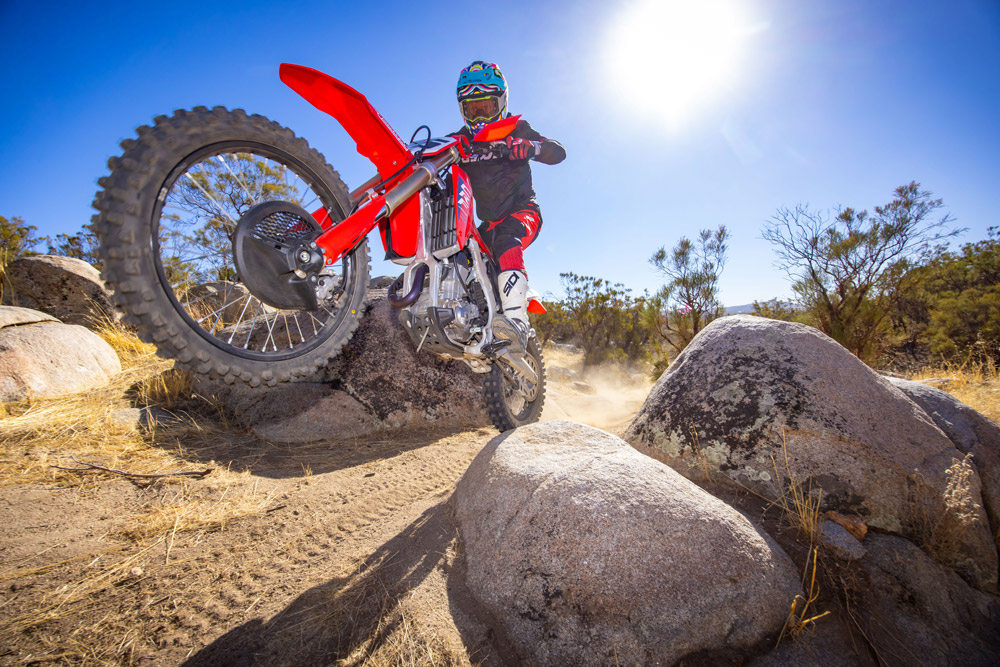
Photography by Simon Cudby and Nitzen
Almost every motocrosser we know also enjoys racing off-road, and nearly every off-roader we know also enjoys racing motocross, even if that just means trying to beat anybody on the track at the same time as them during practice days. Unfortunately, having a liking for both can create a dilemma when searching for a motorcycle to purchase, especially if you enjoy doing both styles of riding equally and want something that performs well at both. What do you get? A motocrosser or off-roader? That’s a toughie. There’s a good chance your budget won’t allow for one of each, but how about one for both? Now that makes sense. A lot of sense when you think about it. Luckily, this is why bikes like the Honda CRF450RX exist.
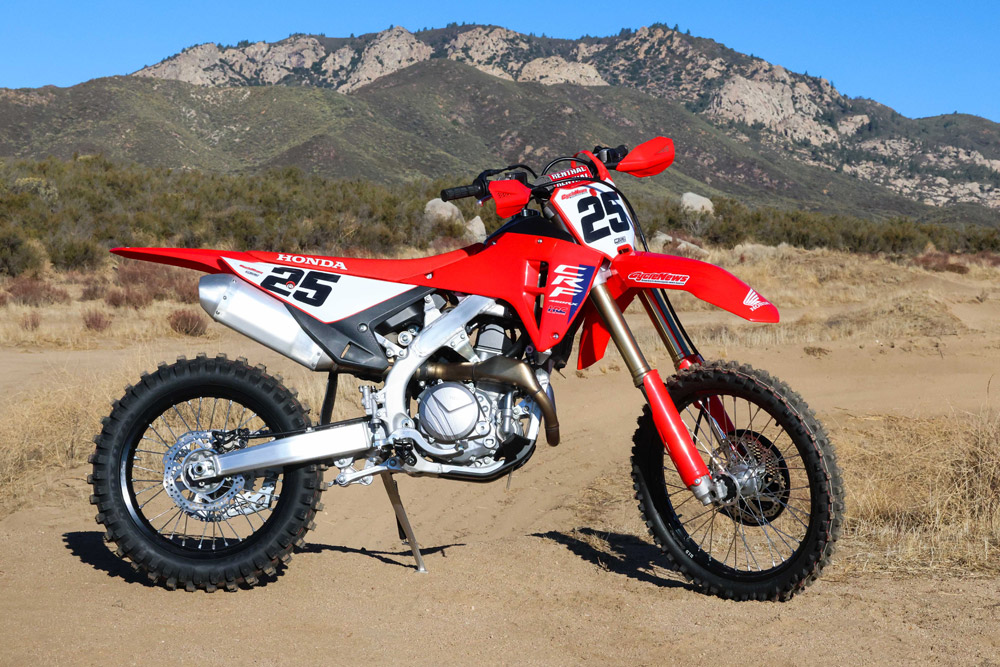
Spec Sheet
The CRF450RX is a relatively new model for Honda. It’s only been around since 2021. It’s a high-performance race bike geared towards Grand Prix (NGPC) and fast-style off-road racing (GNCC, hare scramble, hare and hound, etc.) but doesn’t stray far from its motocross heritage. Just like its CRF450R brethren, the RX enters a new generation for 2025. It gets a new, stiffer frame, updated shock mount, revised rear suspension linkages, and a redesigned airbox, just like what the 2025 CRF450R got. The stiffer frame was a direct result of Hunter and Jett Lawrence’s influences, as they aimed to eliminate the flex and instability from the previous generation, which Honda says benefits the off-road racer, as well.
The R and the RX are very similar motorcycles, but the RX has been tweaked just enough to make it a little more off-road compatible. Most experienced off-road competitors want motocross-type performance from their cross-country racers but with non-negotiable must-haves for off-road racing like what the RX comes with: handguards, skid plate, larger fuel tank, sealed O-ring chain and even a kickstand. You also must have an 18-inch rear wheel, which Honda provides with off-road-specific Dunlop AT81 rubber.
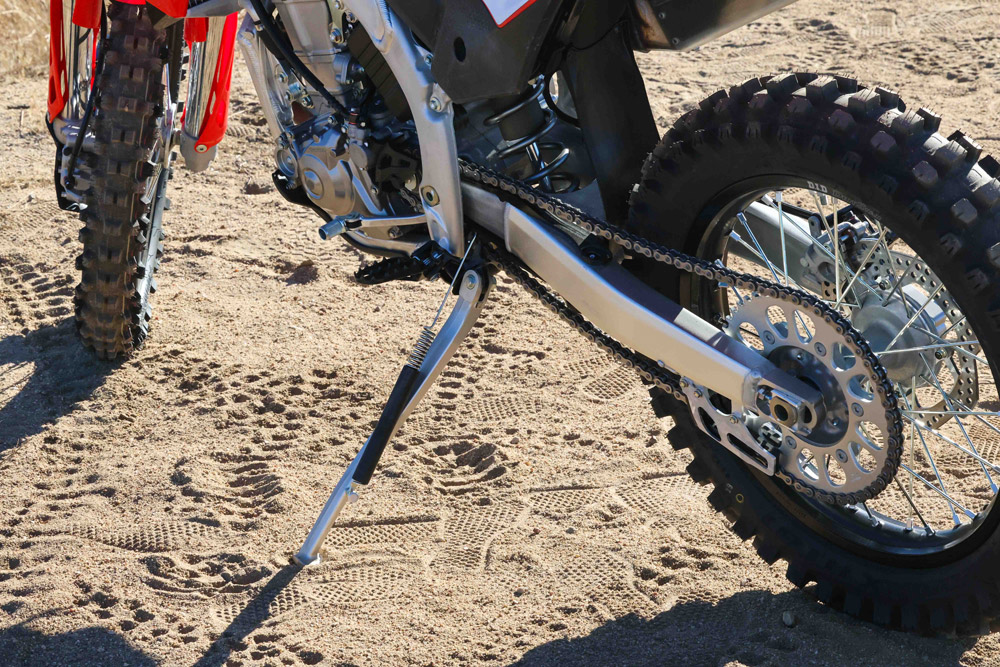
The RX’s dedicated ECU is tuned to prioritize torque and overall traction to the rear wheel. Like before, you still have three riding modes at your fingertips: Standard, Smooth, and Aggressive, as well as three levels of traction control, aka Honda Selectable Torque Control (HSTC). All are tuned with high-performance off-road racing in mind, not to putt around on. Internal gear ratios are the same as the motocrosser but is fitted with a one-tooth larger rear sprocket, 50T versus 49T, working alongside a 13T countershaft sprocket.
You don’t usually want as stiff a suspension for off-road racing as you do for motocross, so the RX’s Showa 49mm coil spring fork and Showa shock, both fully adjustable, have slightly softer spring rates than the R.
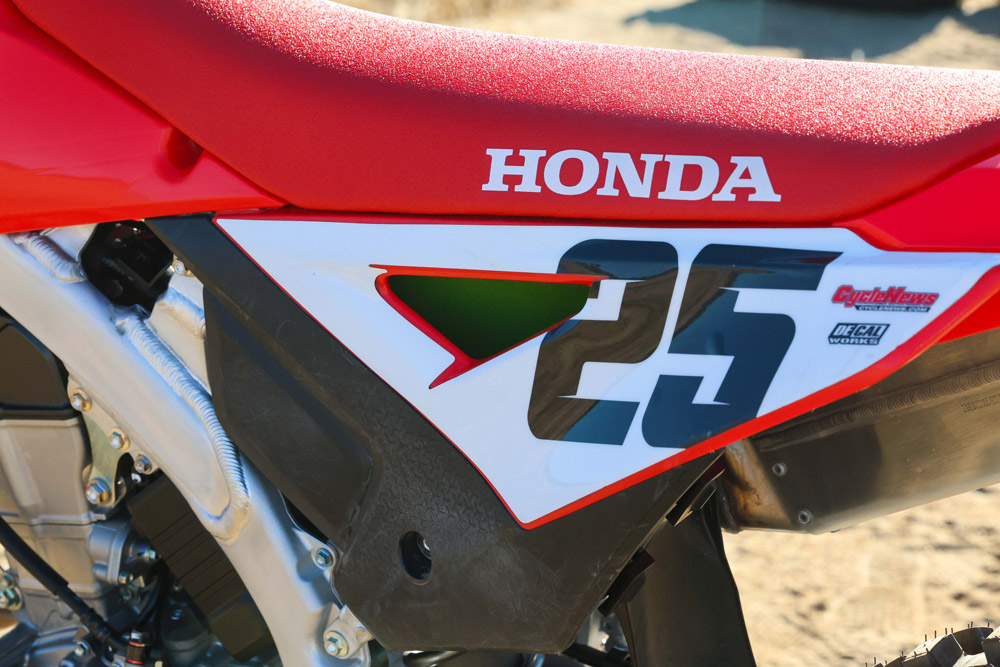
When you add on things like a kickstand, skid plate, handguards, an O-ring chain, a larger fuel tank, and rear sprocket, you also add on some weight, which explains why the RX weighs seven more pounds than its motocross cousin. And, you add price. The RX retails for $300 more than the motocrosser, but that’s a bargain if you were to buy all these parts yourself and have them installed (or save time if you were to bolt them on yourself) to turn your MX bike into a competitive off-road racer.
Some of the Honda CRF450RX’s main competitors are KTM’s XC-F 450, Beta’s 430 and 480 RR Race models, Sherco’s SEF 450, Yamaha’s YZ450FX, and Kawasaki’s KX450X. As you can see, it’s a stacked class.
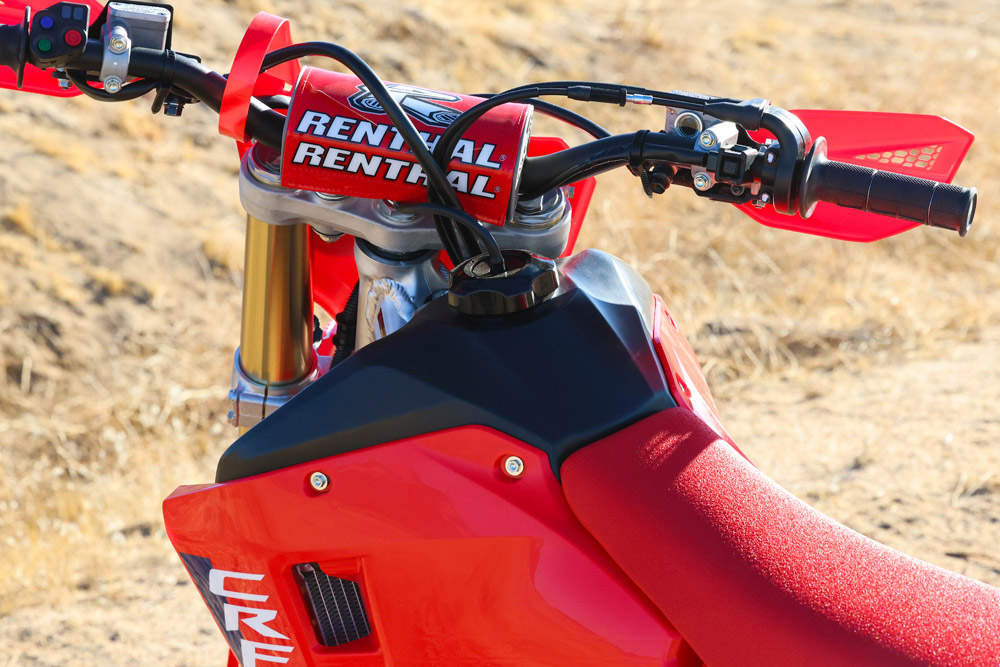
Hitting The Trail
Like your typical Honda CRF450R, the RX feels slim between your legs, and you can feel the textured design on the new side panels that improve leg grip. The radiator shrouds feel thin at the center point, but you can feel the RX’s larger fuel tank where it tapers outward at the front versus the motocrosser. The tank also sits up higher than the R. Compared to the Yamaha YZ450FX, which carries its fuel under the seat, the Yamaha feels a little narrower. The Kawasaki KX450X also feels narrower, but its tank is not oversized, so it holds less fuel.
Powerwise, the new RX feels smooth from top to bottom. The new airbox tones down the engine’s “hit” a bit, making the RX easier to ride and less exhausting overall. We spent much of our first day riding the RX on medium-tight single-track trails and preferred the smooth map (two blinking lights), which made the bike easier to control from low to mid while still packing a punch on top when the trails opened up.
We raced the RX at the Blythe round of the NCPC series, and we went with the smooth option. We gave up a little bottom-end torque and midrange punch in exchange for maximum rideability for the longer 45-minute race. Apparently, it worked—we won our class.
The standard and aggressive maps bring out the RX’s racer DNA and are maps better suited for loamy, sandy and softer conditions. For riders who want the most mellow power character, map two with maximum traction control can help turn this bike into a sneaky “CRF350RX,” if you know what we mean.
Large four-stroke singles are notorious for “flaming out” at the most inopportune times, usually in conditions when the trail is tight and technical and the RPMs are low, but not the Honda—well, not as much as previous RXs. Fueling is right on the money in all areas of the RPM range.
The RX’s suspension is noticeably softer than the R, but it still feels “racey.” Compared to the R, the RX’s suspension settles further into the stroke to absorb chatter bumps with less negative feedback. According to Honda, working with the updated frame rigidity, the suspension can function independently instead of reacting to the movement of the frame. This helps keep front-to-back pitching to a minimum and makes the bike feel more planted to the ground. The fork’s plusher settings also allow riders to hop over trailside obstacles with ease.
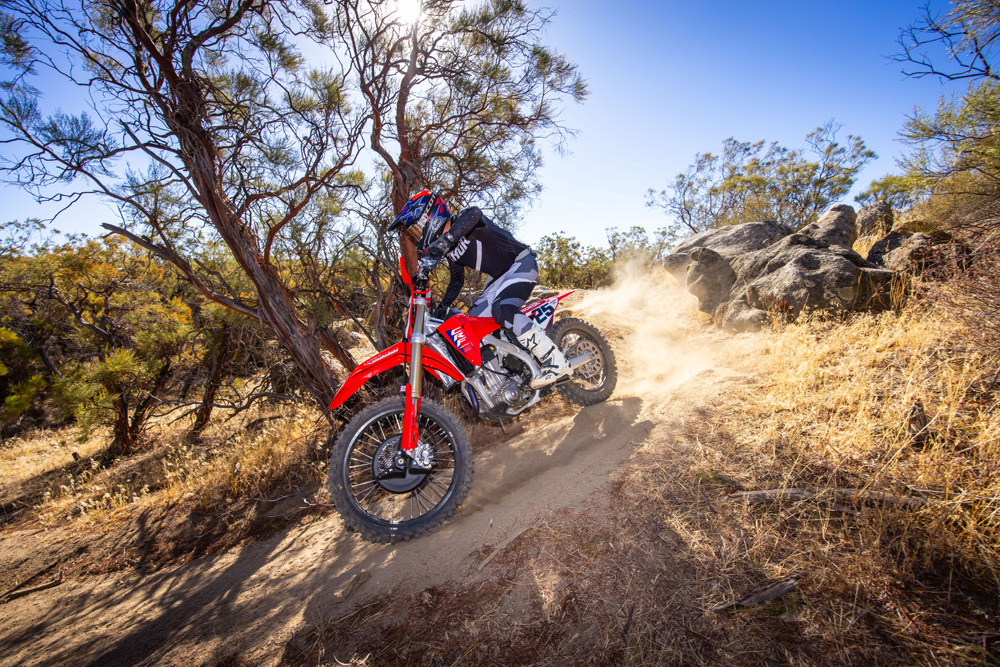
If you want to take the RX to the MX track, no problem. The RX felt great on the motocross portion of the NGPC track, which featured obstacles similar to those you’d find on most vet tracks. For the big jumps and hard landings, however, the suspension is a tick on the soft side, but you can easily feel the R’s motocross DNA living within the RX. Intermediate to experts will likely find the RX’s suspension limits on a more traditional-style moto track. However, a regular weekend warrior will likely be quite content with the RX on their local motocross track and might even prefer its more compliant suspension to that of the stiffer R suspension. Want that “hit” for motocross? Press the Aggressive-mode and you’re good.
Overall, we didn’t have much to complain about. The Dunlop AT 81 tires aren’t as good as the new AT 82s, and the fuel tank feels a little wide, but that’s a small price to pay for more range. We’d investigate replacing it with an aftermarket tank, but we wouldn’t be in any hurry. A six-speed transmission would be nice, which both the KTM and Yamaha have. More gears mean more versatility, but it also means more cost (and weight). Honda made the decision to leave the transmission alone to help keep MSRP down. At $9999, the RX retails $200 less than the Yamaha YZ450FX and $2200 less than the KTM 450 XC-F.
Quick Take
The 2025 Honda CRF450RX is an impressive, high-performance, versatile motorcycle. We even have proof—we won on it! For us, the CRF450RX checks off all the boxes when seeking a single weekend warrior motorcycle that performs exceptionally—even better than it did—in both off-road and motocross worlds.CN
Looking for something smaller? Then there is the 2025 Honda CRF250RX.
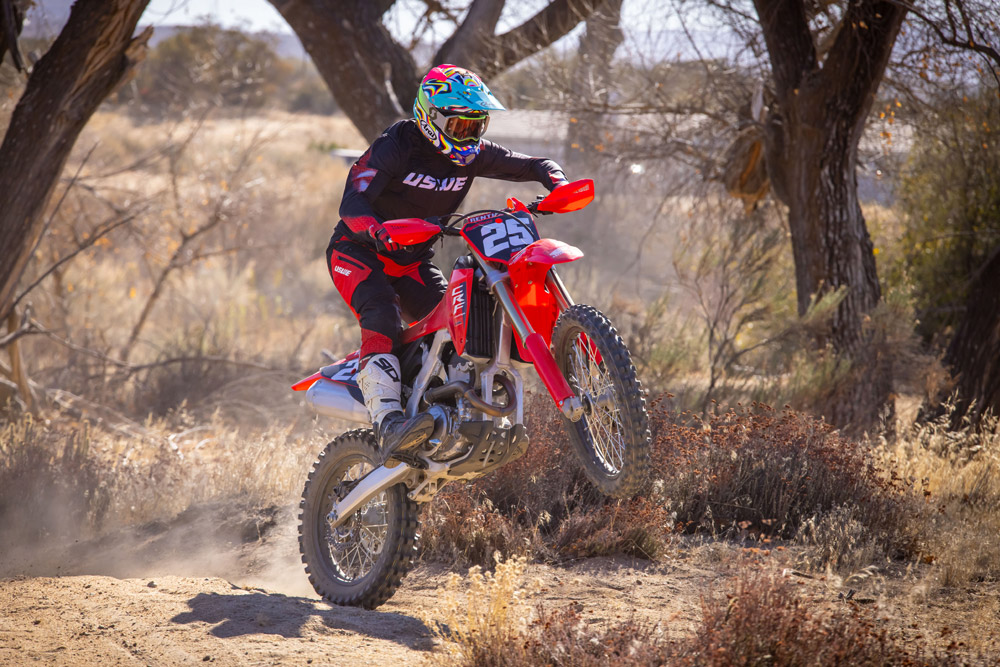
The 2025 Honda CRF250RX is closely based on the all-new CRF250R motocrosser and also receives the same off-road package as the CRF450RX. The 250RX features a higher-capacity 2.1-gallon fuel tank, handguards, kickstand, 18-inch rear wheel, and updated off-road suspension and ECU settings.
VIDEO | 2025 Honda CRF250RX & CRF450RX
What You Need To Know
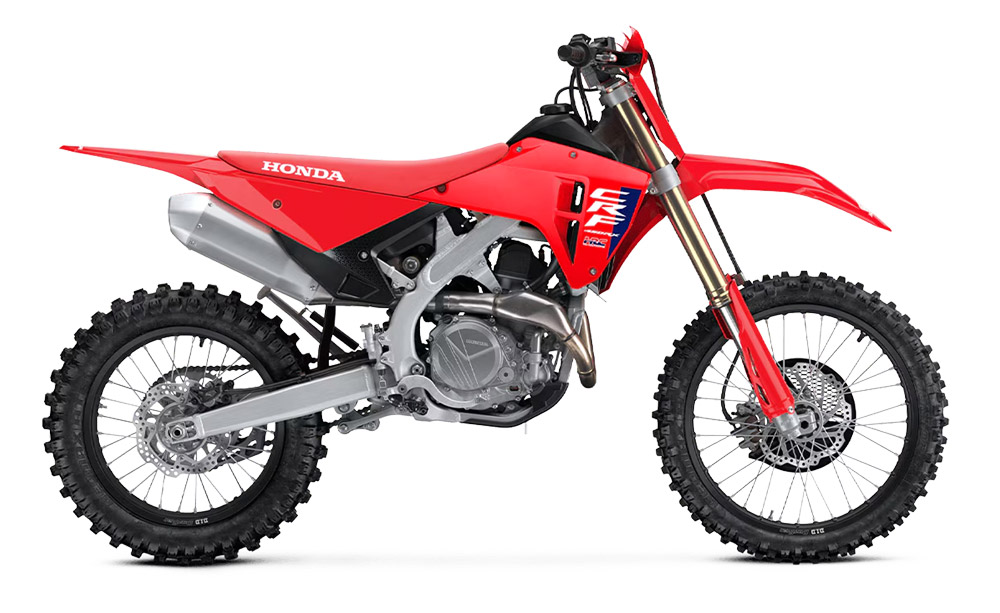
2025 Honda CRF450RX Specifications
| MSRP | $9999 |
| Engine Type | Single-cylinder 4-stroke |
| Cooling System | Liquid |
| Displacement | 450cc |
| Valvetrain | Unicam SOHC 4-valve (titanium, intake) |
| Bore x Stroke | 96.0mm x 62.1mm |
| Compression Ratio | 13.5:1 |
| Starting System | Electric |
| Fueling | Programmed Fuel Injection (PGM-FI); 44mm downdraft throttle body |
| Electronics | 3-selectable engine mode (Standard, Smooth, Aggressive) |
| Rider Aids | Honda Selectable Torque Control (HSTC), HRC Launch Control |
| Transmission | 5-speed |
| Clutch | Nissin, Hydraulic Actuation |
| Frame | Aluminum |
| Front Suspension | 49mm inverted Showa fork, fully adj. |
| Rear Suspension | Pro-Link Showa single shock, fully adj. |
| Front-Wheel Travel | 12.2 in. |
| Rear-Wheel Travel | 12.0 in. |
| Front Wheel | 21 in. |
| Rear Wheel | 18 in. |
| Front Tire | Dunlop Geomax AT81 90/90-21 in. |
| Rear Tire | Dunlop Geomax AT81 120/90-18 in. |
| Final Drive | 13/50 |
| Front Brake | Single 260mm disc with twin-piston caliper |
| Rear Brake | Single 240mm disc |
| Ground Clearance | 13.1 in. |
| Seat Height | 37.7 in. |
| Fuel Capacity | 2.1 gal. |
| Wheelbase | 58.2 in. |
| Weight (wet, claimed) | 256 lbs. |
Click here for the latest Cycle News Off-Road motorcycle reviews and news.
Click here for more Honda motorcycle reviews and news.
Click here to read the 2025 Honda CRF450RX Review in the Cycle News Digital Edition Magazine.

